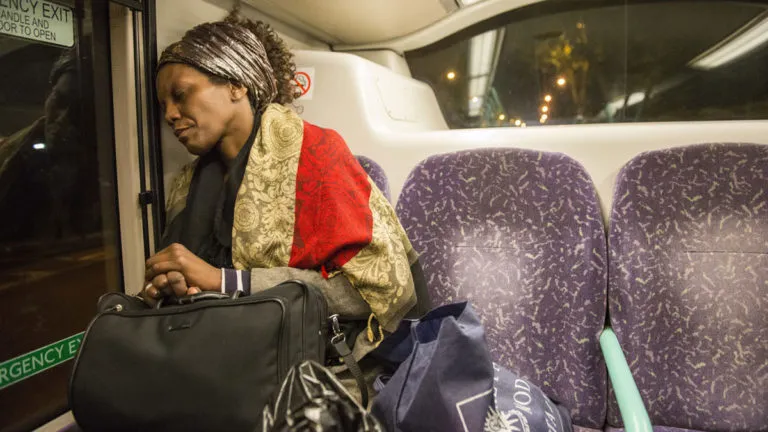COVID or cold? Street homeless people must be guaranteed safe accommodation this winter
Published: by Deborah Garvie

You may not have heard of Kelly Stewart.
She was a 42-year-old ‘much-loved’ mother of three, who was described as ‘gentle’ and ‘cheerful’. She had ‘many talents as an artist, writer and cook’.
Kelly was street homeless and regularly slept on the steps of her childhood church in Barking, East London. It was there, while she was ‘sleeping peacefully’, that she was brutally murdered.
You may not have read about Karna Stephens.
She’s a young woman from Folkestone in Kent, who works as a parcel delivery driver: “I don’t like not working”. She’s the sort of essential worker we’ve come to rely on during the pandemic, and especially during the holiday season.
Karna is street homeless and recently described the ‘devasting’ impact of sleeping in her car for months.
It’s not difficult to imagine how dangerous and frightening it is to be street homeless. Trying to sleep somewhere safe, whether this is a public building, car or shop doorway.
“I’ve been urinated on, set fire to… hit with a baseball bat.”, a man in his 50s told us in 2018.
Every number is a person living (and dying) on the streets
The number of street homeless people has reduced from a shocking high in 2017. But last autumn’s official snapshot found there were 2,688 people estimated to be sleeping rough on a single night in England. This is 52% more than in 2010.
This has contributed to an increase in the number of people dying homeless. 778 homeless men and women died in England and Wales in 2019, according to the most recent official statistics. 112 people took their own lives: a 30% increase in suicides in one year.
The average age at death was 46 years for men and 43 years for women.
**
Prime Minister’s promise**
In 2019, the Prime Minister promised voters that he’d ‘end the blight of rough sleeping’ by the end of 2024. Shortly after his election in February 2020, he described the statistics as ‘totally unacceptable in our great, civilised and rich country’, stating:
Then the pandemic struck.
Pandemic emergency response
As we went into lockdown, the Government showed what can be achieved with political will. They took an unprecedented and speedy approach to protect those out on the streets and sleeping in communal night-shelters.
Consequently, hundreds of lives were saved: although 16 homeless people were recorded as dying COVID-positive in the first lockdown.
Last winter, as we entered further national lockdowns, the Prime Minister continued to stress the importance of ‘looking after those most in need’.
The Government publicly asked councils to ‘make sure every rough sleeper is offered somewhere safe to go’ and provided funding to all councils in England ‘to redouble their efforts to help accommodate all those currently sleeping rough’.
The Government has said this ‘everyone in’ approach had helped 37,000 people into emergency accommodation by February this year. This showed that it is possible to get people off the streets. Though our recent research shows that the key to ending street homelessness is preventing further cases and making sure those offered emergency accommodation can move on to a settled home.
People need protection from another pandemic winter
This winter, in addition to the usual risks of assault, harassment and hopelessness, the ongoing pandemic presents a double threat to the lives of street homeless people:
-
Developing COVID-19 and flu. Though the government is yet to confirm this, reports show that most street homeless people are not fully-vaccinated against coronavirus. On the street, the winter advice to ‘stay at home if you’re feeling unwell’ isn’t an option. Even following directions on regular hand-washing can be a challenge.
-
Harder than usual to escape fatal wet and cold winter weather. This is because the necessary guidance and funding to keep night-shelters and hostels COVID-safe has led to reports of a big reduction in winter beds.
Unlike last year, it’s not clear from the Government if people on the streets should expect to be offered emergency accommodation this winter . While councils have been allocated increased Rough Sleeping Initiative funding, they’ve been given no clear directions. In fact, there are reports they’ve been instructed to move people out of hotels.
We’re regularly approached by street homeless people turned away by councils without an offer of accommodation, often because they don’t meet the legal criteria.
What must be done?
As we enter another pandemic winter, we’ve urged the Government to build on Theresa May’s 2018 Rough Sleeping Strategy, by setting out a clear roadmap out of homelessness – including building the permanent social rented homes that people desperately need.
The first step in this roadmap must be a clear direction to councils that everyone at risk of the streets should be offered safe emergency accommodation and support during the ongoing pandemic.
Once people are safely in accommodation, their health and social care needs can be assessed and help offered – including registering with a GP, vaccination and treatment for mental health problems and addictions. Such help can be pretty futile while people remain on the streets.
What can you do?
As you venture out this winter, please don’t ignore the human tragedy of people on our streets. Or think that street homelessness is inevitable. It’s not.
Please sign our petition to ask the Prime Minister to give a clear direction to councils that every woman and man on our streets should be offered emergency accommodation and support during the ongoing pandemic.